Taking Care of Yourself
Journalists who are exposed to catastrophe may themselves develop symptoms of primary trauma, through experiencing or witnessing disastrous events, or losing someone close to them.
But even journalists who just cover tragedies, without an immediate personal connection, often experience what psychologists call “secondary” or “vicarious” trauma, in which they absorb some of the pain or grief they encounter in the course of their reporting.
Stress
In the initial stage of covering a disaster, many journalists feel a surge of energy. Their brains are flooding their systems with stress hormones and adrenaline. They focus on the task at hand and push themselves beyond their normal limits. (Other considerations, like paying bills and attending to family needs, may fall by the wayside.) After a period of some days – varying from person to person – the adrenal glands are depleted. This often leads to an energy slump and a feeling of mild depression, which is frequently temporary.
This process is related to what psychiatrists call an “acute stress response.” These symptoms can include nightmares, sweating, sleeplessness, and a change in appetite. Another common symptom is the flashback – the inner eye’s repetition of traumatic events. Some people experience a “startle effect,” in which abrupt noises cause them to react. These symptoms are usually temporary, and are not considered signs of deeper illness. The severity usually depends on how close the individual is to the epicenter of the event – the closer, the more pronounced the reaction.
Individuals or families who
have had psychological problems beforehand often find that the
event exacerbates their problems. Medium-term effects can include
susceptibility to illness, skin breakouts, and other physical
reactions. Mental reactions can include poor concentration, memory
problems, irritability, and self-criticism. If you experience none
of these, terrific. If you do experience any of them, remember that
these are normal reactions to an abnormal
situation.
What you can do
Journalists and those around them can alleviate some of these symptoms. While it is often unrealistic to halt the adrenaline phase in the midst of a breaking story, it can help to know that it necessary must end – often before the story does. News managers should anticipate this, even with their most “superhuman” journalists, and be prepared with some form of rotation. Creating a supportive newsroom environment should be a priority.
Journalists should be aware that large doses of caffeine worsen the symptoms of stress, and can be especially detrimental to memory. Try not to increase your coffee consumption. Alcohol should be consumed sparingly, if at all. It is a depressant, and can exacerbate the “crash” when it comes. It also lowers the immune threshold, making physical illness more likely. A high rate of consumption increases the risk of long-term mental illness.
Journalists who are “too busy to eat” for days will find that the crash will be worse with a depleted metabolism. If you are asking athletic feats of endurance of your body, treat it with an athlete’s consideration, making sure you consume both proteins and healthy carbohydrates. You should also be getting vitamins, especially B and E. A diet of caffeine, junk food, and alcohol will lower your resistance – losing you work time in the end. If possible, add at least a measure of exercise and quiet reflection into your day. If it is not possible, try for periodic stretching and short breaks from the story. Don’t be embarrassed if you find yourself indulging in escapism or humor, as long as it doesn’t hurt anyone. These are normal defenses.
Sleep is important. If you have trouble sleeping, don’t watch television news for an hour before trying to go to sleep. Read something, preferably boring. Studies suggest that very small doses of melatonin (1-3 mg), available over the counter, can be helpful. Another aid is Benedryl, an over-the-counter allergy medication, taken in 25-50 mg doses. This can help for up tofour to five days. Do not resort to alcohol to help you sleep – as noted above, it does more harm than good. If your sleep is consistently prevented and disrupted by negative thoughts, you may want to talk to your doctor, who can prescribe mild medication to help.
It is generally a good and positive process to talk out what you’re experiencing as you go along. Journalists often find that the material they’re covering is too painful or frightening to discuss with their families. It is good to contact a friend who is strong enough to listen. Crying is often positive and cathartic, especially if you can do it in private with a friend, and not worry about its effect on your family. Talking to a mental health professional can also be helpful – not because you are mentally ill, but because these people can offer good techniques for managing stress and trauma. If you are religious, this is a good time to draw on that resource, even if you haven’t practiced in a while. Be kind to yourself. Do something that you know you always find soothing.
Other issues:
1. Some journalists feel guilt because they fear that they are advancing their careers through others’ misfortunes. Human beings have always coped with catastrophe by creating an explanatory narrative, and conducting some form of public grieving. The news media has assumed parts of these roles for our culture. Helping people tell their stories in a respectful and empathetic way can be therapeutic for the afflicted. Reporters can learn techniques that will help them avoid abusive or damaging journalistic practices.
2. When reacting to stories, bear in mind that most people do recover from tragedy and go on with their lives. Even for the most distressingly bereaved, the prognosis is very good for the vast majority. Most people recover from the physical effects of acute emotional trauma within about six weeks. (In the case of significant loss or bereavement, intense feelings of grief often last six to twelve months.)
3. One of the most common emotions amidst a tragedy is the feeling of being “peripheral.” Journalists may compare themselves with colleagues who are taking on “heroic” roles in the coverage, and feel useless and inadequate. But just as doctors include both emergency room physicians and cancer specialists, journalism needs many different metabolisms. Journalists who are not on the front lines should know that supporting the overall effort is immensely valuable. Furthermore, stories quickly move into different phases, each of which may require different skills and sources.
4. Journalists may feel that they aren’t “entitled” to emotional reactions if they are not directly affected by a catastrophe. But many of them in fact are experiencing secondary trauma as an outgrowth of their reporting. Their work may not allow them to distance themselves from the disaster as much as the general population. Furthermore, the medical community is starting to recognize that disasters can create a traumatized population – where mental health becomes a public health issue. Journalists are also part of the general population.
5. Do not assume that sadness and depression are the same thing. Deep sadness is a normal response to tragedy. A classic definition of depression, on the other hand, is “feelings of hopelessness, helplessness, and an inescapably bleak future” which persist for more than two weeks. Other signs include a significant loss of functioning and persistent thoughts of harming oneself or others. Physical effects can include nausea and headache. Journalists, doctors, relief workers, and others who have first-hand experience with catastrophe report that there are often medium-term psychological effects. It may take nine to twelve months to resume functioning normally, and this period can be prolonged if there is no chance to work through, or “metabolize,” the experience. Taking protective measures early on can lessen the aftershocks.
-----------------------------------------------------------------------------------------------------------------------------------------
Anne Nelson, Columbia Graduate School of Journalism and Dr. Daniel Nelson, MD, University of Cincinnati


Freedom of Information, the Press and Civil Society
25 March 2010 || CCJD || Red Batario
________________________________________
16 October 2008 || CCJD || Red Batario
________________________________________
Corruption-Proofing the MDGs: Public Journalism Initiatives in Philippine Communities
17 July 2008 || CCJD || Red Batario
________________________________________
Media and War: A Tangled Relationship?
18 July 2007 || CCJD || Red Batario
________________________________________
Embedded Journalism:The Rights and Protection of Journalists Covering Armed Conflict
24 February 2007 || CCJD || Red Batario
________________________________________
Journalists Under Fire: Years of Living Dangerously, Again
26 May 2006 || CCJD || Red Batario
________________________________________
Media Governance, Media in Governance: Bad News, Good News
03 December 2004 || CCJD || Red Batario
________________________________________
Media’s Role in Conflict and Terrorism
12 December 2003 || CCJD || Red Batario
________________________________________
Bringing the News Back to Where it Belongs: The People
11 October 2002 || CCJD || Red Batario


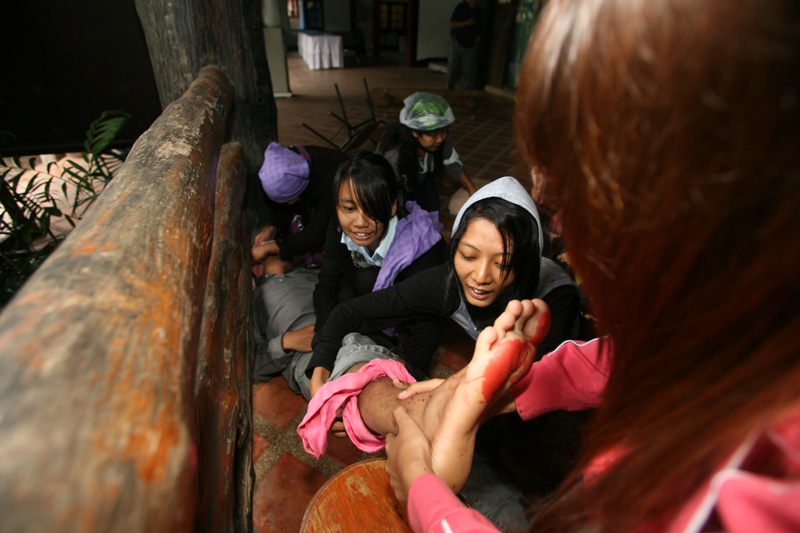
Young Burmese Journalists learn basic first aid and survival techniques
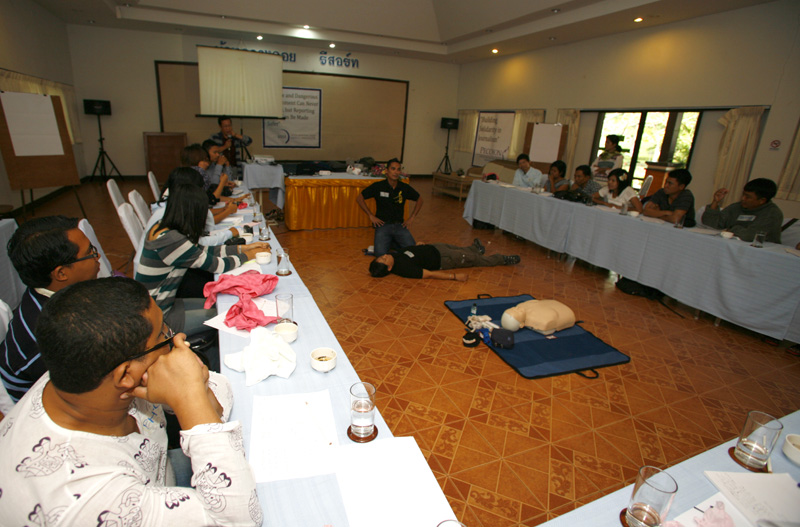
Burmese journalists watching basic life support demonstration prior to practical exercise.
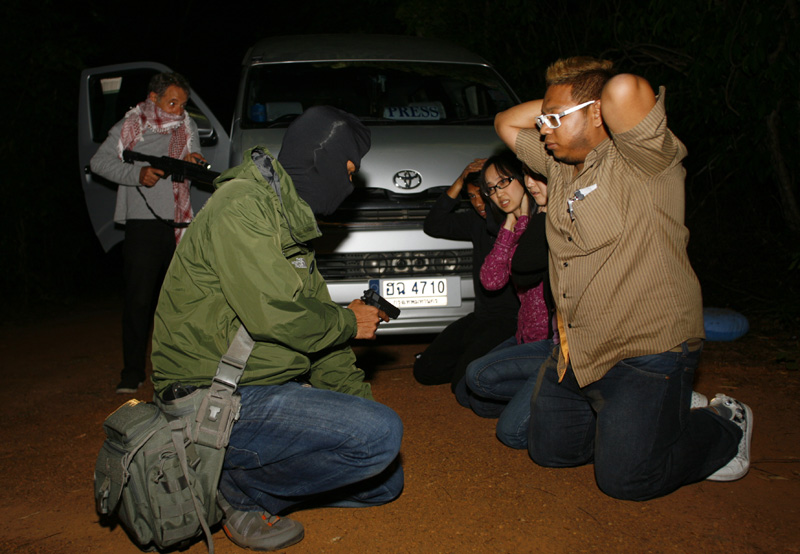
How to reach when threatened with guns and possible abduction.
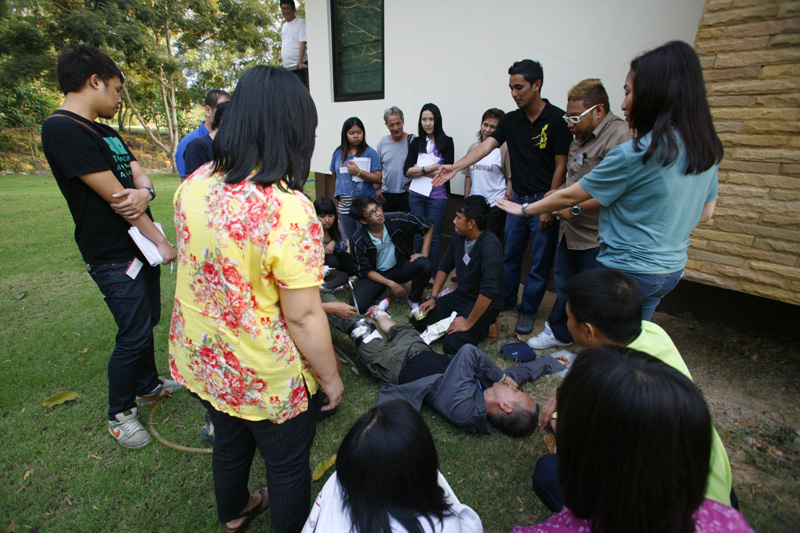
Field exercise on treating gunshot wounds prepares Thai journalists for the rigors of the training exercise.
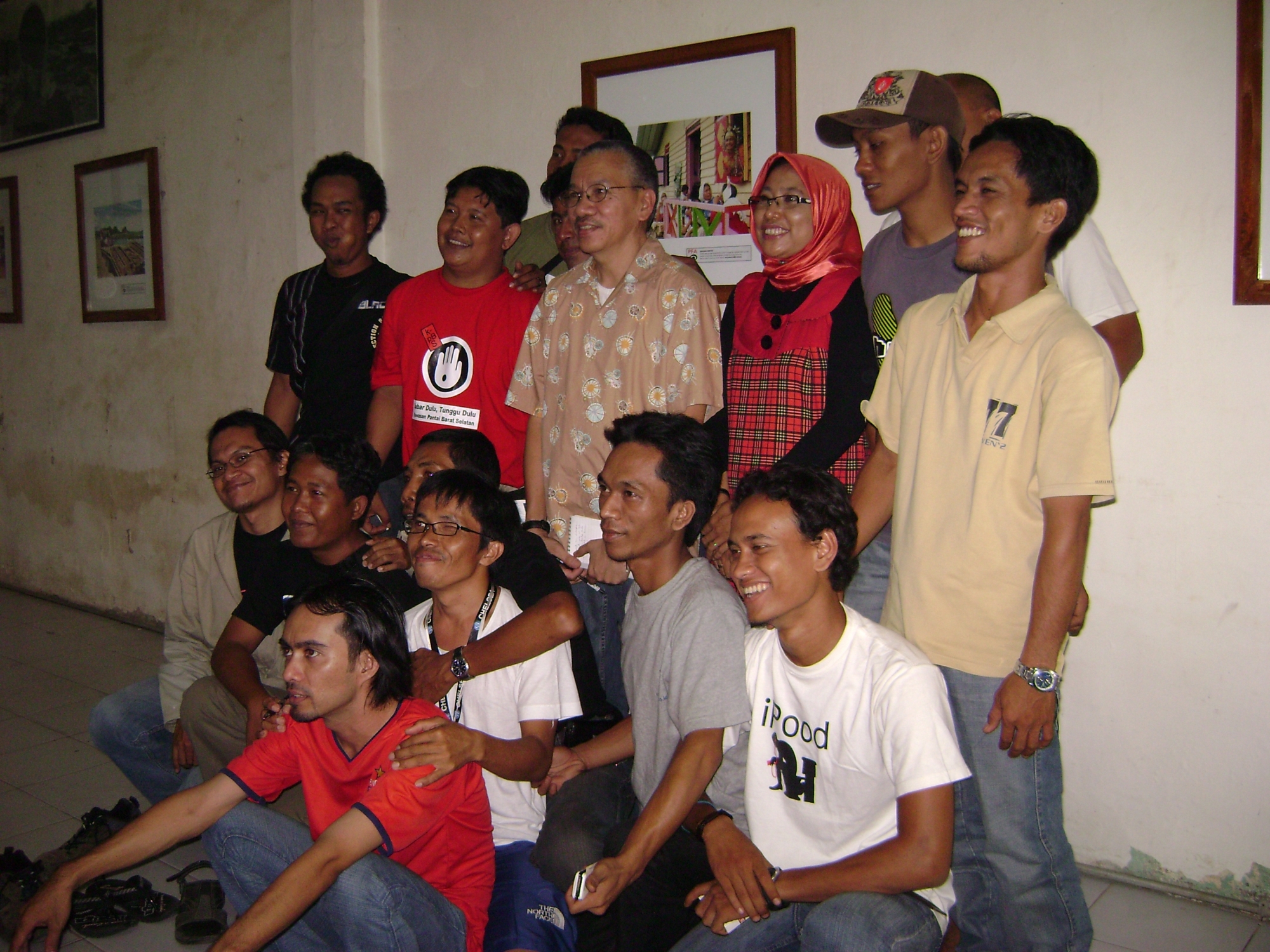
Post-Tsunami meeting wth Journalists in Banda Aceh, Indonesia

Governance, Democracy and Development
Peace and Conflict
Transparency and Accountability
Women and Children
Indigenous People
Center for Community Journalism and Development
4th Flr., FSS Building I, 89 Scout Castor,
Barangay Laging Handa, Quezon City
Philippines

All Right Reserved @ Center for Community Journalism and Development 2013